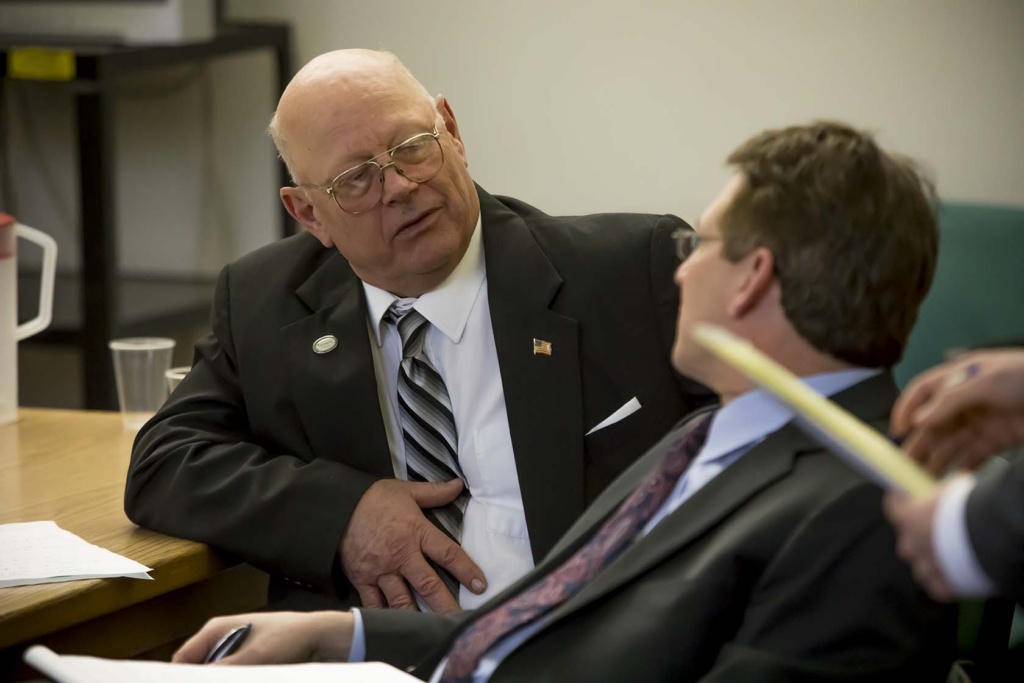EX-SENATOR’S TRIAL STILL IN LIMBO, PUBLIC HEARS WIRE TAP

By Gregory J. Lamoureux
ST. ALBANS – It was yet another long day for former state Sen. Norman McAllister as he seeks to get a trial in his alleged sexual assault case.
At odds is whether Judge Martin Maley, should grant McAllister’s request to have his plea agreement thrown out and grant him access to a new trial.
McAllister pleaded no contest to a felony count of lewd and lascivious conduct and two counts of prohibited acts the day before his January trial was set to start.
McAllister, through his new attorney Bob Katims, argues that McAllister of Highgate wasn’t well informed of what he was pleading to, or how that might affect his sentence.
But in a rare criminal court twist, the defense has the burden of proof in this type of hearing.
McAllister’s former lawyers, Brooks McArthur and David Williams would ultimately be called by the state to testify as to what McAllister knew and when.
“In my opinion, the evidence was… umm… significant,” McArthur said on the stand as he explained why his advice to McAllister was to work out a plea agreement in the case.
“To understand you’d have to listen to the recorded conversation… that recorded conversation is devastating,” McArthur said.
For the first time, that recording was played in an open courtroom for the public and judge to hear.
“I can’t afford everybody anymore,” McAllister is heard saying to a woman in the first few minutes of the tape. McAllister was referring to getting paid for rent that the woman was, alleged, at least in part, trading for sex with McAllister.
McAllister goes on to say that going forward the rent needs to be paid in money, not work on the farm, “or anything like that.”
About six minutes into the recording it begins to get graphic. McAllister and the victim start talking about their sexual contacts with each other. Contact in which McAllister has openly said was a consensual relationship between the pair.
McArthur and Williams portrayed several offers made by the state in the year and a half between when McAllister was arrested in May of 2015 and when he ultimately took the plea agreement in January of this year.
Several of those offers, all of which were initiated by the prosecution, involved the possibility of life in prison, with a minimum sentence of three years.
WIRE TAP
The content in this wire tap recording might be offensive for many readers.
Please use your own discretion.
It wasn’t until the day before McAllister’s trial when the jury selection process was going on, that the two sides began to come to a middle ground with an offer that didn’t include a possibility of life in prison.
Williams testified that he told McAllister of another case that he had worked on where the defendant had turned down several offers which had a three-year minimum, only to have a conviction and a much longer prison sentence handed down.
Katims argued that this was overly pressurizing McAllister and he did not have the adequate time to think of what he agreed to.
The final few details of plea agreement came down to the way he was pleading, according to Williams.
Both former defense attorneys said that McAllister seemed more interested in protecting himself from the civil suit than from the criminal conviction.
“He was concerned about his land,” McArthur said, “his land was his life and that was all he had to give to his kids.”
McArthor went on to explain that he educated McAllister on the difference between pleading guilty and pleading no contest.
A guilty plea is agreeing that the defendant committed the crime, while a no contest plea is agreeing that a jury might convict based upon the evidence available.
The case was not ruled on by Maley. Instead, the defense will have a week to file their final arguments, followed by another week for the state to file their arguments.
[bar group=”86,87,88″]









